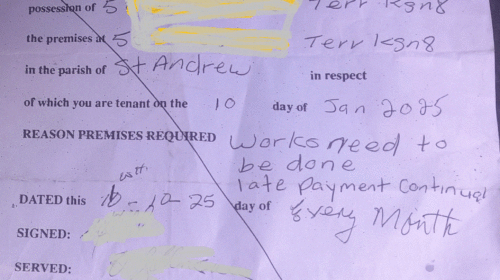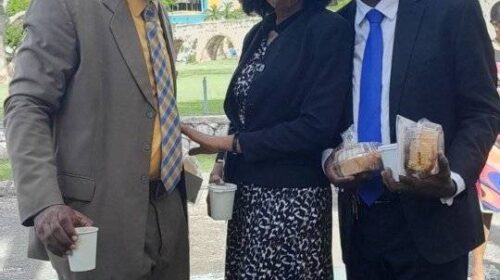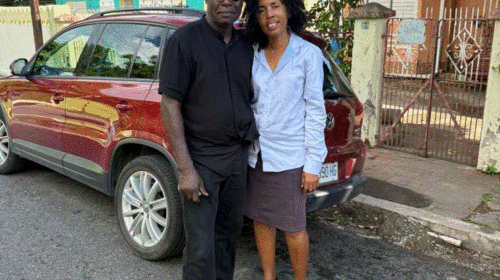SOME ARGUE THIS PERSON ‘S TESTIMONY IS PADDED, FABRICATED. SOME CLAIM HE WAS KICKED OUT AND SO HE RUNS THIS VERSION OF HIS TALE. EITHER WAY, SOME POINTS WILL NOT BE FAR FROM REALITY.
THE Jamaica Observer mediahouse has sourced a copy of the cooperating witness statement which was presented in the United States Southern District Court by prosecutors seeking to imprison former Tivoli Gardens strongman Christopher ‘Dudus’ Coke to the maximum 23 years prescribed under US law.
The following is the full text of the statement:
Declaration in connection with the sentencing of Christopher Michael Coke, aka “Duddus” or “Shortman”
I, Cooperating Witness 1 (”CW-1”), hereby declare:
1. I am a citizen of Jamaica. I am submitting this declaration under the name “John Doe,” instead of my true name, because I am afraid that my family members who resides in Jamaica would be at risk of harm were my identity disclosed. For the same reason, this declaration omits certain facts about myself and my prior conduct that might, if disclosed, reveal my identity.
The Coke Family, Tivoli Gardens & the Shower Posse Organisation
2. I became acquainted with Christopher Michael Coke, whom I knew as “Dudus,” and “Shortman,” (hereinafter “Dudus”), through my relationship with his father, Lester Lloyd Coke, whom I also knew as “Jim Brown” (hereinafter “Jim Brown.”) A photograph of an individual I recognize to be Dudus is attached hereto as Exhibit A; a photograph of an individual I recognise to be Jim Brown is attached hereto as Exhibit B.
3. I was introduced to Jim Brown in or around the late 1980s. Thereafter, I served as one of Jim Brown’s bodyguards from the late 1980s, until he was incarcerated in Jamaica in the early 1990s. During this time period, and until about one year after Jim Brown’s death, I lived in the Tivoli Gardens area. Prior to Jim Brown’s incarceration, I saw Jim Brown on a daily basis. I also saw and became acquainted with two of his sons, one of whom I knew as “Jah-T,” and the other of whom I knew as “Duddus” or “Shortman.” A photograph of an individual I recognize to be “Jah-T” is attached as Exhibit C. Overtime, I became, in essence, a trusted senior counselor to the Organisation. Jim Brown periodically paid me for my services, in amounts up to $40,000 Jamaican dollars at a time.
4. In the late 1980s, Jim Brown was the leader of the Shower Posse, a criminal organization based in Jamaica (hereinafter the “Shower Posse” or the “Organisation”), and the “area leader” of Tivoli Gardens and the surrounding community. After the death of Jim Brown and of Duddus’ brother Jah-T, Duddus became the leader of the Organisation. Members of the Shower Posse — both at that time and at least through the late 1990s — were involved in activities such as murder, extortion, armed robbery, narcotics trafficking and firearms trafficking, in Jamaica and in the United States.
5.. Those Organisation members who relocated to the United States from Jamaica were obligated to contribute a portion of their illegal gains back to Jamaica to support the Organisation. Contributions could be made in the form of cash, goods such as clothing or appliances, or firearms. Relatives of these US based Shower Posse members who remained in Jamaica were at risk of physical harm by members of the Organisation if these contributions were not forthcoming. I was aware of this arrangement — referred to as the “System” — both because I discussed it with Dudus, Jah-T and Jim Brown and because I was aware of it by virtue of living in Tivoli Gardens.
6. The Shower Posse was headquarters in Tivoli Gardens, a garrison community in Kingston, Jamaica. By “garrison” community, I mean a neighbourhood whose members are armed by the leader of the community — Jim Brown in the late 1980s, later his son, known as “Jah-T” and following their deaths, Duddus — and also a neighbourhood that is loyal to and affiliated with one of the major Jamaican political parties — in the case of Tivoli Gardens at that time and through the present time, the Jamaican Labour Party. The residents of the Tivoli Gardens community (and of similar “garrison” communities in Kingston) are generally among the poorer citizens of Jamaica. The housing in which most residents of Tivoli Gardens live was built by Government, when the Jamaican Labour Party (”JLP”) was in power. The vast majority of these residents do not pay rent, nor do they pay for utilities such as electricity and water.
7. As the area leader, Jim Brown (and later Jah-T, and then Dudus after Jah-T’s death) served as the unelected head of the entire Tivoli Gardens community, and certain parts of the surrounding area including Denham Town, in addition to being the leader of the Shower Posse. As the area leader, Duddus, like his father and brother, provided certain services to the community. For example, he assigned paid work to members of the community arising out of Government contracts that he obtained — such as contracts to clean streets, fix roads or engage in other construction projects. For these projects, Dudus would deduct from the salaries paid a portion of funds as a contribution to the “System” — essentially a required payment to the Organisation which was used to purchase guns and ammunition and also to provide assistance to the members of the community.
8. Duddus also provided funds to individuals on an assented basis — generally for food, medical care, school supplies or other necessities. He also held what was known as “treat.” “Treats” are community events at which various artists would perform for the community, for free, and at which necessities would be handed out to community members, such as school supplies, packages of food and holiday gifts. Such events were held approximately two or three times per year. “Treats” were open to outsiders but the distributions of food and supplies were for community members only. In addition, Dudus held “dances,” events that were also open to outsiders as well as community members, for a fee. Dances were held to raise money for medical care or other community needs.
9. Duddus also imposed a strict code of behaviour and discipline within the community, which was enforced at times through violence, as described further below. IN my opinion, Dudus provided assistance and benefits to the community in part to main the goodwill and loyalty of its members , and in particular the community’s senior members who were politically active and well-regarded by Member of Parliament affiliated with the JLP. These senior members of the community received, at times in my presence, greater amounts of cash and goods from Dudus than other members received. Particularly in light of the harsh code of discipline that Dudus imposed on the community, financial assistance and benefits were necessary to maintain the loyalty of the community members.
10. After Jim Brown’s death, and the death of his son Jah-T, Dudus became the area leader of Tivoli Gardens and the head of the Organisation. I believe that because I had been close to Dudus’ father, Dudus trusted me, and as a result, he asked me to play a similar role for him as I had for his father. Dudus also paid me periodically, though not as much as his father had. After Dudus became the area leader, and for approximately one year thereafter, I saw him on a daily basis, sometimes for hours at a time.
Acts of Violence
11. In or around early 1992, after the death of his father Jim Brown and his brother “Jah-T,” I had conversation with Duddus about his plans to run the Organisation . Dudus said, in substance, that he needed to obtain more high-powered weapons because through having “heavy machines” such as rifles, he could have more power. I understood this to mean both power within the Organisation but also within Jamaica. Duddus said the Organisation had a lot of handguns, but needed larger weapons. Dudus also said that the older members of the Organisation needed to understand that he (Dudus) would be running the Organisation now.
12. Shortly after Jim Brown’s death, Duddus gathered approximately eight to ten people, including myself, in an area of Tivoli Gardens known as “Top Ten.” I was armed with a handgun and Dudus had a handgun with him as well. The group walked to a location in Tivoli Gardens known as “Ebenezer Lane,” in an area know as “Bumps,” close to Spanish Town Road. An individual known as “Stumbo,” who was also known as “Honey” lived in that location. Stumbo was one of the elder leaders of the Shower Posse. Upon arriving at that location, the group found Stumbo standing outside on Ebenezer Lane. Dudus asked Stumbo, in substance, if Stumbo was “with him” or not, meaning would Stumbo recognize Dudus as the leader of the Organisation. Stumbo appeared hesitant. Dudus then fired his handgun over Stumbo’s head. Stumbo then said, in substance that he (Stumbo) would support Dudus and the group returned to “Top Ten.”
13. Dudus, like his father and brother before him, maintained a group of loyal, armed men referred to as “Shotters.” There were approximately two hundred Shotters at any one time, although not all were active. The Shotters were paid by Duddus and their duties included protecting Duddus and the Tivoli Gardens community from attacks by members of rival communities and to prevent law enforcement or military personnel from entering Tivoli Gardens. The Shotters also enforced the code of community discipline imposed by Duddus, including by engaging in acts of violence. As a result of the Shotters’ activities, very few crimes were committed within Tivoli Gardens and the surrounding communities, except those crimes that Dudus authorized. Shotters were also deployed to “campaign” on behalf of the JLP party, primarily outside the Tivoli Gardens community. In that capacity, the Shotters (who were armed at the time) went door-to-door in different areas to ensure that voters living in those areas supported the JLP party, including through use of intimidation.
14. Shotters were residents of Tivoli Gardens and the surrounding area, ranging in age from as young as 14 years old to 30 or 40 years old. To become a Shotter, school-age boys would spend time with known Shotters who would “break them in” — initially asking the boys to run errands (such as purchasing food), to act as lookouts or to hold Shotters’ handguns if, for example, law enforcement might be in the area. These boys, because they were of school-age and wore school uniforms, were less likely to be searched by the police. I personally witnessed school-age boys in uniform performing these tasks. Over time, boys would be asked to “bleach” — meaning to stay up all night in the community acting as lookouts in the event that members of rival communities threatened the community or law enforcement or the military tried to enter the community. Upon becoming a Shotter, the boys would be given access to firearms, to be carried at the times and at the direction of Dudus and senior members of the Organisation. Senior Shotters were permitted to hold and store their own firearms when they were within the Tivoli Gardens community and surrounding area. Loss of a firearm was an extremely serious offense that could result in a number of penalties, including death.
15. For example, in or about 1992 or 1993, I recall an occasion on which a Shotter known as “Screbeng” committed an unauthorized robbery — meaning that Dudus had not directed the robbery or been informed of it in advance – outside Tivoli Gardens and the immediate area. I do not recall the specific circumstances of the robbery itself, but I later learned from other Organisation members that Screbeng and others went to the Cross Roads area in Kingston where the robbery was committed. Following the robbery, Screbeng and the others were involved in a car chase by Jamaican Constabulary Force officers in which shots were exchanged. Screbeng and others later abandoned their vehicle, leaving behind Screbeng’s firearm — one that he had been issued by the Organisation.
16. In my presence, another member of the Shower Posse reported this incident to Dudus. We were in Tivoli Gardens at the time, in either the “Top Ten” or “Java” areas. In my presence, Duddus sent for Screbeng, who arrived shortly thereafter. Dudus then spoke to Screbeng and told Screbeng that he would allow Screbeng a period of a set number of days (I do not recall how many) to obtain a handgun to replace the one Screbeng had lost. Duddus said that Screbeng would have been shot and killed immediately but for the role Screbeng had played with regard to an individual known as Trevor.
17. I later heard from another member of the community that the period of time allotted to Screbeng to replace the lost firearm passed and Screbeng did not replace it. I also heard that Screbeng was subsequently shot and killed in his home in Denham Town, in the “Four Story” area, and I never saw Screbeng again. While I did not speak to Dudus again about this incident, I know that a Shotter at Screbeng’s level could not have been killed in that area unless he was killed at Dudus’ direction and by men under Dudus’ control.
18. In another incident that occurred shortly after the death of Jim Brown, Dudus told me that he believed that Ludlow Wilson aka “Blood,” (hereinafter “Blood”) another member of the Shower Posse, was responsible for Jah-T’s death. From conversations with Dudus and other members of the Shower Posse, I learned that Jah-T was shot to death on a street known as Maxfield Avenue while riding his motorcycle. He was killed by former Shotters who had become disloyal to the Organisation. I understand that Duddus believed that Blood was responsible for Jah-T’s death, because Blood had driven on Maxfield Avenue shortly before Jah-T rode there on his motorcycle, and Blood had antagonised the same people who subsequently shot Jah-T. Duddus also told me that he believed Blood was an “informer”.
19. Very late one evening or early the next morning, I was in the “Top Ten” area with Dudus and several other high-level members of the Shower Posse. Dudus said that Blood was an informer and that he was “for dead,” meaning that Blood should be killed. In my presence, Dudus instructed a member of the Organisation to locate Blood, who was at a dance that evening in close proximity to Tivoli Gardens. After learning that Blood was leaving the dance, Dudus sent at least two people to Blood’s residence which was close to the Lizard Town area of Tivoli Gardens. I remained with Dudus, in Top Ten. Shortly thereafter, I heard gunshots. A short while later, the individuals Dudus had sent to Blood’s residence returned to the Top Ten area, holding handguns, and one of them reported that he had “dealt with the boy” referring to Blood. Then, also in my presence, Dudus directed a boy of about sixteen years of age to obtain a cart (a flatbed on wheels) from nearby Coronation Market, to put Blood’s body on the cart and leave the body near the railway line that runs past Tivoli Gardens high school, in an area called “Industrial Terrace.” This was an area that was often used by the Organisation to dispose of bodies.
20. Within the next month, while I was with Dudus and other in the Top Ten area, Dudus gathered approximately four Shotters and sent a high-level Shower Posse member to obtain a number of rifles from the Lizard Town and Java areas. Dudus then directed the Shotters to go to Maxfield Avenue and “shoot up the Avenue” which means to kill as many people as they could.
Dudus said that the Shotters must do that in retaliation for Jah-T’s death (presumably because Jah-T had been killed on Maxfield Avenue). The Shotters left thereafter and returned within an hour. They reported that they had “dealt with it.” I later learned that four or five people were shot on Maxfield Avenue by the Shotters that evening, including two females.
21. During the time that Dudus was in control of Tivoli Gardens, Dudus, like Jim Brown, imposed a strict code of conduct upon members of the Tivoli Gardens and surrounding areas such Denham Town did not report crimes or acts of violence to the Jamaican police, known as the Jamaica Constabulary Force. Instead, residents of Tivoli Gardens reported such incidents to Dudus directly, in his office, in an area know as “Center.” The area known as “Center” includes Dudus’ office and a nearby Community Center. The office is actually a building composed of one or two rooms, containing Dudus’ desk and chair, and chairs for visitors to sit in. Dudus typically used the office for meetings to discuss social events, as well as to receive complaints from members of the community. During the week, Dudus spent several hours per day in the office. I was present on a number of occasions when complaints were made and incidents were reported. Duddus would then listen to both parties and make a determination about who was right and who was wrong. Duddus would then direct the Shotters or other senior members of the Organisation to impose a penalty.
22. For domestic disputes brought to Dudus’ attention that could not be settled amicably, Dudus would typically direct that a beating be given to the party that was in the wrong, whether male or female. Beatings would be carried out in the “Center” area in public view, at Dudus’ request. I have observed several such beatings, including beatings carried out with baseball bats and/or the butt of a firearm. Beatings often resulting in bleeding, and broken hands and feet that required hospitalisation.
23. When the wrong involved stealing, for example from stalls in Coronation Market, the penalty would be a shooting, usually in the hand or foot. In that case, the shooting would be carried out in the “jail.” The jail is a concrete structure with walls on all four sides and a roof. The interior of the jail is approximately 12 feet by 12 feet. The structure does not have an actual door, but the entrance-way is sometimes blocked by removable boards. The jail is near a bridge that connects the “Center” area to the “Java” area, and it is adjacent to a building that was used as a storage area. There is also a gully very close to the jail.
24. Certain offenses, including repeat offenses, were punishable by death. For example, several people from the area of Denham Town know as “Four Story” reported that an individual known as “Cutter” was stealing from people in the community in order to buy crack. “Cutter” was a member of the Organisation and one of the Shotters, and he had been the subject of prior complaints. In my presence, Dudus directed several Shotters to bring Cutter to the office. Less than one hour later, Cutter arrived at the office. Dudus told Cutter that Dudus had received multiple reports that Cutter was stealing and reminded Cutter that he (Dudus) had warned Cutter not to steal in the past. Cutter responded that he had a crack habit that caused him to do these things and that he would not do it again. Dudus then directed that Cutter go for a “walk” and approximately two or three of the Shotters walked behind Cutter, in the direction of the jail. I followed behind them and I observed that Dudus had a chrome handgun in his front pants pocket. I don’t recall whether the Shotters were armed but I do not recall seeing any firearms on their persons.
25. I saw Duddus and approximately two Shotters enter the Jail with Cutter. I could not see inside the jail at the point.
I heart Cutter shouting and begging for help. I heard Cutter say things such as “No Bossy!” It sounded to me as if Cutter was being beaten. After about ten minutes or less I heard an explosion that sounded like a gunshot. I observed Dudus and the Shotters leave the jail. Dudus walked towards the office and one of the Shotters remained near the entrance to the jail. I walked towards the jail and looked inside. I saw Cutter sitting on the ground with his back against the wall. He was bleeding profusely from his groin. Cutter asked for help but I did not do anything to help him. I stayed outside near the office thereafter. I later learned that Cutter had died that day.
26. In another incident, a husband and wife (hereinafter the “Parents”), living near the “Java” area of Tivoli Gardens, were shot at Dudus’ direction, and one of them was killed. this was because their grown children, who had relocated to the United States, refused to send money to Dudus. Prior to Jah-T’s death, Jah-T had traveled to the United States, and stayed briefly with these children (the “Individuals”) whom he had known in childhood. These Individuals were involved in narcotics trafficking in the US. While staying with the individuals, Jah-T robbed them of cash, jewelry and drugs at gunpoint. Jah-T told me about this and showed me some of the jewelry he stole when he returned to Jamaica. After Jah-T’s death, Dudus told me that Duddus requested that the individuals, who still lived in the United States, send money to Dudus to assist the Shower Posse and the brothers refused. Thereafter, in my presence, sitting outside in the Top Ten area, Dudus directed two of the Shotters (including one person who did not live in Tivoli Gardens) to go to the Parents’ home to “deal with” the Parents, meaning to kill them. Both the Shotters were carrying handguns at the time Dudus gave this instruction. Shortly thereafter, the two Shotters returned to the Top Ten area and reported that both parents had been shot and were dead. I later learned that only one of the Parents had died and that one had been shot and survived.
Firearms Trafficking
27. I had several conversations with Dudus about firearms. As noted above, Dudus said that he needed heavy machines and heavy firepower to maintain his control over the Organisation and within jamaica. Dudus told me that he obtained the majority of his firearms form Miami and New York and that he was primarily interested in receiving rifles or “long guns” because he already had a lot of handguns or “short guns.” Dudus explained to me that most fo the guns wre sent to him by people associated with the “system.” I understood that to mean that most of the guns were sent by people who used to reside in the Tivoli Gardens or Denham town areas, whose families continued to reside there, and who now resided in the United States. Dudus told me that in general, the people residing in the United States were involved in narcotics trafficking, and that the cocaine that Dudus sent to the United States generated proceeds that helped pay for the guns.
28. Dudus explained that firearms sent from the United States are packaged in appliances, refrigerators and deep freezes and that handguns and ammunition could also be sent down in food stuffs, including rice and flour, as well as in soap boxes. I have seen the shotters and high-level members of the Shower Posse, in Dudus’ presence, dismantling these appliances and taking apart the food stuffs or retrieve the firearms. These activities occurred in the Belgium areas as well as in Java area. I have also observed that , when shipments of firearms were received, Dudus directed that other members of the Organisation retrieve and store them. On average, in my experience, the shipments Dudus received contained at least five firearms, usually a mix of rifles and handguns. Such shipments arrived approximately every tow to three months. I was also in Dudus’ presence on at least one occasion when a representatives of an area that was aligned with Tivoli Gardens and affiliated with the JLP asked Dudus to lend additional firearms because that area was having a conflict with an area loyal to the People’s National Party, the main rival to the JLP. Dudus agreed to do so.
29. In early 1990’s, I recall that approximately five members of the Organisation were responsible for storing the firearms that Dudus received. Firearms were generally stored in the homes of elderly residents, or residents who had legitimate jobs and therefore were less likely to be suspected or searched by the police. These people were not asked whether they wanted to store guns in their homes. Shotters would arrive at their homes and place the guns either in the ceilings or in the back or front yards. Shotters would break long guns into parts, put the parts in rubber inner tubes and bury the tubes in the ground.
30. On at least five occasions, on a bridge that is close to the Jail and that separates the Java area from the Center area, I, along with Dudus and others “test fired” guns that had just arrived from the United States. I recall that Dudus particularly liked an assault rifle manufactured by HK, a German-make firearm that uses 7.62 millimeter rounds, which Dudus specifically referred to in my presence as “the Bomber.” Dudus also liked the Carbine M-16 assault rifle. He test-fired both of these types of firearms in my presence. With respect to handguns, Dudus preferred the Glock and the Desert Eagle, though Dudus commented to me that the Desert Eagle was too big to carry around.
Cocaine Trafficking
31. Like Jim Brown and Jah-T, Dudus directed that he was the only person within the community of Tivoli Gardens and the surrounding area who could sell crack cocaine. Dudus sold crack out of approximately five locations, all of which I personally visited. I visited those five locations because on numerous occasions, I accompanied a member of the Organization who was responsible for picking up money from all five crack house and bringing it to Dudus. Two of these locations were in Java, a third was close to the Top Ten area, a fourth was located in Little King Street (which was near the Denham Town police station) and the fifth was in the Lizard Town area. From these locations, Dudus generally sold smaller quantities of crack cocaine to people in the Tivoli Gardens Community, and larger multi-ounce quantities, including in powder form, to residents of other communities. these crack housed generated approximately $100,000 Jamaican dollars (approximately $4,300 US dollars) per week in the early 1990s.
32. On at least three occasions in or around 1992, I was present in an area within Tivoli Gardens called “Belgium” in an apartment on the top floor of a multi-story building (the “Apartment”). The Apartment had a reinforced steel door that had been tested by firing at the door with an “H-K,” a German manufactured automatic rifle. The Apartment had been used by Jim Brown as a “safe house”. On those approximately three occasions, two or three females arrived in Tivoli Gardens and Dudus and I would escort them to the Apartment. I do not know how these females were selected, but they were not residents of Tivoli Gardens or the surrounded area.
33. Once in the Apartment, the females would be given condoms filled with cocaine that had been formed into a cylindrical shape. to achieve this cylindrical shape, the cocaine would be beaten down in one of the two crack houses controlled by Dudus that were located in Java. I have personally seen the cocaine being formed into this shape at that location, which I visited to learn more about this process. I observed that the cocaine was first beaten into powder, placed in a condom, wrapped in masking tape and then beaten with a hammer so that it compacted into a cylindrical shape. The quantity of cocaine in each package was usually 9 – 12 ounces. I have accompanied other members of the Organisation who carried the cocaine in each package was usually 9 to 12 ounces. I have accompanied other members of the Organisation who carried the cocaine from that Java crack house to the Apartment.
34. Once we escorted the females up to the Apartment, each female would be given a package of the wrapped cocaine and instructed to insert it in her vagina to make sure that it fit. The exterior of the cylinder would be lubricated with jelly or vaseline for that purpose. If the cocaine did not fit, it would be hammered or beaten at the Apartment and the female was instructed to try it insert it again. Dudus, myself and other senior members of the Organization were present at various times during this process.
35. Once the cocaine was made to fit, the females were given partial payment in U.S. Dollars and airplane tickets – to either New York or Miami, Florida. Dudus either instructed that the females to call a specific telephone number when they arrived in the US or told them that they would be picked up at the airport. Dudus asked that females what they were wearing so that he could pass that information to the people who would be meeting them in the United States. Dudus further instructed the females to provide the cocaine to whomever picked them up. He told the females that when they returned to Jamaica they would be paid in full. ON each of the approximately three occasions that I witnessed this, different females were involved. Many of the females were known as “higglers” – informal commercial importers who sold various types of goods in the local markets in Kingston such as clothing and foodstuffs. The females had visas allowing them to travel to the US.
36. At around the same time period, I was also aware of a woman in her early 30s known as “Petal” who also transported cocaine to the United States (primarily to New York but also to Miami) for Dudus. Petal lived close to the Java area and received cocaine for transportation – packaged in the same manner as the cocaine described above – from Dudus in his office in Tivoli Gardens.
37. I was present with Dudus on a number occasions in the office, well over five times, when Petal received cocaine from Dudus for this purpose. Another senior member of the Organisation transported the cocaine to the Office for this purpose and was present when it was given to Petal. Petal was also given airplane tickets and partial payment in US dollars. Petal was particularly trusted by Dudus and therefore was permitted to take the cocaine and insert it in her body at home prior to traveling. Petal was unusual in that she was a very large woman who could carry more cocaine that the other females – Petal’s quantity was typically over 12 ounces. I recall this specifically because the size was a topic of conversation among Dudus and others. During this same time, I also spoke with two other women who told me that they were also involved in transporting cocaine to the United States by the same method for Dudus.
38. In coronation Market, a large area within Tivoli Gardens where individual vendors sold food, clothing and other items, vendors were required by law to pay the Jamaican Government for the space to sell their goods. Dudus also required that vendors pay a fee to him in order to sell their goods in the market area. Dudus tasked a senior member of the Organisation to inform vendors that they had to pay this fee, and to collect the fee. The fee was collected on a monthly basis and anyone who did not pay the fee was told that he or she could not sell in the marketplace anymore. I was present on a number of occasions when that senior member of the Organization came to the Office in Tivoli Gardens an gave Dudus the money that he had collected from the vendors in Coronation Market. I am not aware of anyone who refused to pay the fee, but it was well-known that those who did not pay would be subject to physical harm by members of the Organisation if they continued to sell their goods in market. In addition, when a “treat” or other community event was held, other senior members of the Organisation, at Dudus’ direction, would require the local businesses to contribute goods, or cash. If the businesses refused to do so, they would not be allowed to operate in the area.
Personal Background & Criminal History
39. I am cooperating with, among other Districts, the United States Attorney’s Office for the Southern District of New York. I was charged with, and pled guilty to, conspiracy to distribute over five kilograms of cocaine and over 1,000 kilograms of marijuana, knowing and intending that the narcotics would be imported into the United States. I participated in narcotics trafficking activities in jamaican and elsewhere for over ten years and during that period I was involved in the transportation and/or distribution of approximately 3,000 kilograms of cocaine, a large portion of which I knew was destined for the United States. Christopher Michael Coke was not involved in the distribution or transportation of this cocaine. I carried a firearm in connection, with my narcotics trafficking activities to protect myself, and the narcotics and money that I transported, but I never used violence or threats of violence in connection with those activities. I also recruited and directed other individuals in those narcotics trafficking activities.
40. I was not actually involved in marijuana trafficking, although I falsely acknowledged that I was, in my plea agreement and at my plea proceeding in federal District Court. In addition, certain facts relating to the cocaine trafficking activities described in my plea agreement and at my plea proceeding were not accurate, but i said, falsely, that they were. I did so because i wanted to resolve my case with a guilty plea to a cooperation agreement. I did not, however, ever otherwise acknowledge or make false statements about my criminal conduct in any debriefings with law enforcement agents or prosecutors. In addition, I have reviewed certain statement made by Government witnesses in connection with my prosecution and while those statements are generally accurate as to my criminal conduct, there are certain specific statements made by those witnesses that I do not believe are accurate. Furthermore, I have acknowledged, in my debriefings with the Government, that I participated in additional conduct in jamaica that was unlawful, including acts of violence and the making of false statements, some of which were under oath. I was never prosecuted for that conduct in Jamaica.
41. In connection with my guilty plea, I entered into a formal cooperation agreement with the United States. Following my guilty plea, I was sentenced to a lengthy term of imprisonment. I know that the government has agreed to make a motion for reduction of sentence pursuant to Federal Rule of Criminal Procedure 35 (”Rule 35)”) on my behalf should the Government conclude, in its discretion, that I have provided substantial assistance. I know that the Government will consider my cooperation in the instant case, including the filing of this declaration, in making that determination. I also know that any sentence I receive upon any re-sentencing pursuant to Rule 35 is at the discretion of the District Court Judge, who can sentence me to as little as time served. That is the sentence I hope to receive, but no promises have been made to me as to whether the Government will file a Rule 35 motion and, if such a motion is filed, what sentence will result.
42. This declaration does not include everything I know about Duddus and the other senior members of the Organisation. Where I have referred to conversations that I had with these individuals, I have not attempted to relate what was said verbatim, but in substance.
Pursuant to 28 U.S.C 1745, I hereby declare under penalty of perjury that the foregoing is true and correct.
Executed on : May 21, 2012
New York, New York
http://www.jamaicaobserver.com/latestnews/Complete-text-of-cooperating-witness-statement-against–Dudus-
Author Profile
- ... author, qualified & experienced in journalism, creative writing, editing, the arts, art critique, paralegal, photography, teaching, research, event planning, motivational speaking, workshops for children and adults, visual arts etc. Click here for contact form. ...or email me here
Latest entries
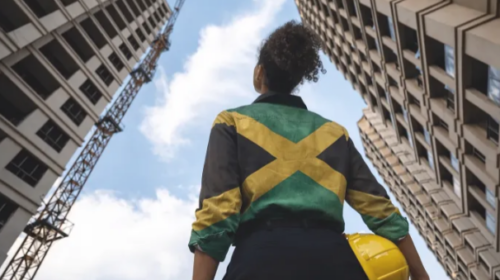 AdvertorialFebruary 11, 2026Let’s build Jamaica, lets love Jamaica
AdvertorialFebruary 11, 2026Let’s build Jamaica, lets love Jamaica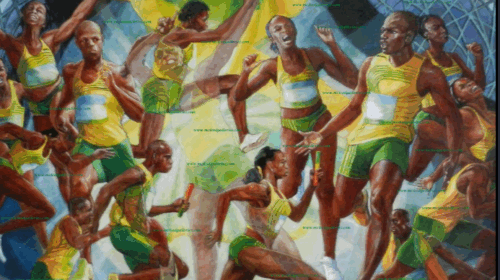 AdvertorialJanuary 30, 2026Support Jamaica Art on www.antheamcgibbon.com
AdvertorialJanuary 30, 2026Support Jamaica Art on www.antheamcgibbon.com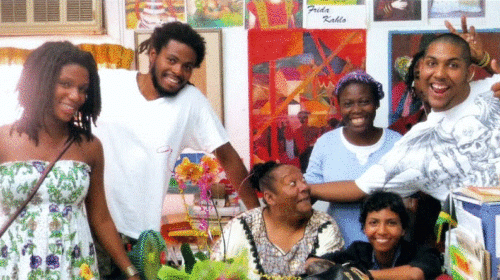 Jamaica Art ScopeJanuary 28, 2026Hope ‘Sweetie’ Wheeler hosts dynamic art studio
Jamaica Art ScopeJanuary 28, 2026Hope ‘Sweetie’ Wheeler hosts dynamic art studio Raw and DirectJanuary 25, 2026JAMAICANS BEWARE: Jobs at risk for vanishing by 2027
Raw and DirectJanuary 25, 2026JAMAICANS BEWARE: Jobs at risk for vanishing by 2027


